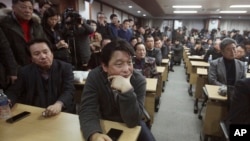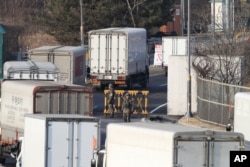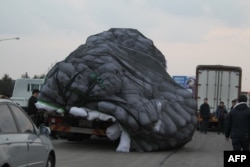South Korean companies hit hard by Seoul's decision to suspend operations at an inter-Korean industrial complex are trying to save the joint venture from being permanently abandoned.
Until recently, the Kaesong Industrial Complex was a rare example of substantive economic engagement between the two Koreas, raising hope for serious economic exchanges and better ties between the two nations.
The industrial park, situated in the North Korean border city of Kaesong, was home to 124 South Korean companies that employed about 54,000 North Korean workers. Last year, the output of the companies at the complex exceeded $500 million for the first time since its opening in 2004, according to the South Korean government.
Nuclear tensions
A monthlong standoff over Pyongyang's provocative nuclear posture, however, turned it into a military zone.
South Korea suspended all operations at the complex Wednesday in response to North Korea's nuclear test and long-range missile launch. North Korea responded by expelling all South Korean employees from the facility, forcing them to leave on short notice.
The communist country also froze assets in the complex and ordered its military to take over the zone.
"We are appealing to both governments to revive the Kaesong Industrial Complex, which is a symbol of inter-Korean economic cooperation and peaceful coexistence," said an association of the South Korean companies in a statement.
Heavy financial toll
Park Yong-man, who ran a garment factory in the complex, told VOA the two governments should allow company representatives to visit the site and bring back equipment, goods and raw materials to South Korea.
"We are sincerely hoping that the South Korean authority will ask the North Korean authority for talks and the North Korean authority will cooperate on the request," Park said.
The shutdown is expected to impose a heavy financial toll on the companies, mostly small- and medium-size firms. Some experts estimated the move could cost them more than $1.6 billion.
Seoul announced a plan Friday to provide financial assistance to the companies and vowed to minimize the damage as much as possible. The plan includes a measure to provide them with $230 million immediately through insurance.
Reopening unlikely
Despite the appeal, experts say there appears to be little hope that the complex will reopen.
Nam Kwang-kyu, a professor at Seoul-based Korea University who specializes in North Korea, said Seoul is not likely to budge unless Pyongyang changes its nuclear stance.
"Given growing nuclear and missile threats posed by North Korea, Seoul must have felt it had to use its last leverage over Pyongyang," Nam said.
On Friday, Seoul said it had completely cut the supply of electricity and water to the complex and areas nearby. This marked the first time that Seoul took such a measure since the opening of the complex.
Before the shutdown, Seoul provided 17,000 tons of water a day to Kaesong, which was used by the park's factories and area residents.
Seoul is also keeping its military vigilant against further aggression by Pyongyang.
U.S. sends support
On Thursday, Washington expressed support for Seoul's decision to close the complex, calling it a "principled and firm approach" toward Pyongyang.
Katina Adams, a spokesperson for the U.S. State Department, told VOA the decision "reflects growing concern in the region about North Korea's growing threat and flagrant disregard of multiple U.N. Security Council resolutions."
In defiance of international sanctions, Pyongyang conducted its fourth nuclear test Jan. 6, followed by a long-range missile launch Feb. 7. The launch marked the country's sixth long-range missile test since 1998.
Baik Sungwon contributed to this report, which was produced in collaboration with VOA Korean Service.






